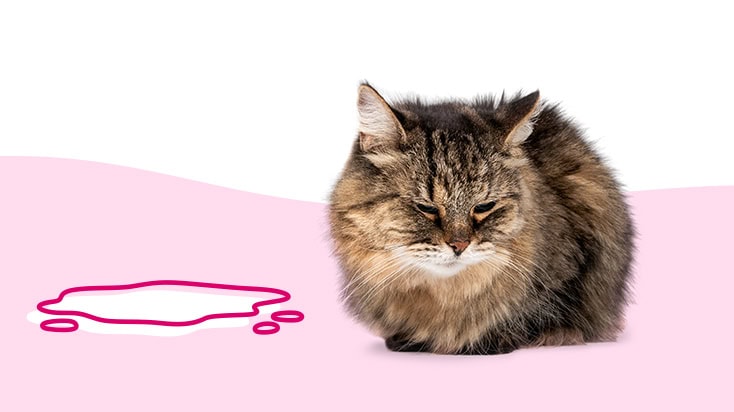Table of Contents
Noticing your cat peeing blood can be alarming and concerning. This condition, medically known as hematuria, is often a sign of an underlying health problem that requires prompt attention. While some causes are mild and treatable, others can be severe or life-threatening.
Understanding why your cat has this issue is important. Recognizing the symptoms is also key. Knowing the best treatment options can help your pet get the care it needs.
This article will look at why a cat might pee blood. We will cover the symptoms to watch for, the available treatments, and the ways to prevent this issue in the future.
Common Causes of Blood in Cat Urine
Several health conditions can cause a cat to have blood in its urine. Below are the most frequent reasons:
1. Urinary Tract Infections (UTIs)
Bacterial infections in the urinary tract can cause inflammation, discomfort, and blood in the urine. Cats with a UTI may urinate frequently, strain while urinating, or avoid the litter box.
2. Feline Lower Urinary Tract Disease (FLUTD)
FLUTD is a broad term for various urinary disorders, including infections, inflammation, and bladder stones. This condition can lead to painful urination, increased frequency, and bloody urine.
3. Bladder Stones
Mineral deposits in the bladder can irritate the lining and cause bleeding. If left untreated, bladder stones can block the urinary tract, leading to a life-threatening emergency.
4. Physical Trauma
An injury to the lower abdomen, like a fall or hit, can cause internal bleeding. This bleeding may appear in the urine. Even minor trauma can cause significant health issues in cats.
5. Tumors or Cancer
Bladder or urinary tract tumors are rare but can lead to blood in the urine. Older cats are more likely to develop urinary system cancers, which require immediate medical evaluation.
6. Stress-Induced Cystitis
Feline idiopathic cystitis (FIC) is a condition where stress causes bladder inflammation, leading to blood in the urine. Environmental changes, new pets, or disruptions in routine can trigger this condition.
Signs and Symptoms to Watch For
If your cat is peeing blood, there may be other symptoms indicating an underlying health issue. Common signs include:
- Straining or difficulty urinating
- Frequent urination in small amounts
- Crying or vocalizing while urinating
- Urinating outside the litter box
- Excessive licking of the genital area
- Strong-smelling or cloudy urine
- Lethargy, reduced appetite, or signs of discomfort
If you notice any of these symptoms, consult a veterinarian as soon as possible.
How Veterinarians Diagnose the Condition
To determine the cause of blood in your cat’s urine, a veterinarian may perform the following diagnostic tests:
- Urinalysis: Examines urine for infections, crystals, and blood.
- Blood tests: Assesses overall health and kidney function.
- X-rays or ultrasound: Detects bladder stones, tumors, or structural abnormalities.
- Bacterial culture: Identifies specific bacteria causing an infection.
A prompt and accurate diagnosis ensures the most effective treatment plan for your cat.
Treatment Options for Cat Peeing Blood
Treatment varies depending on the cause of hematuria. Common approaches include:
- Antibiotics to treat bacterial infections
- Prescription urinary diets to dissolve bladder stones
- Pain relief and anti-inflammatory medications to reduce discomfort
- Surgery or specialized procedures for removing large bladder stones or tumors
- Stress management techniques for stress-induced urinary issues
In cases of urinary blockages, emergency veterinary care is required to relieve the obstruction and prevent serious complications.
Preventing Blood in Cat Urine
Taking preventive measures can significantly reduce the risk of urinary problems in cats. Here are some essential steps:
1. Keep Your Cat Hydrated
Encouraging your cat to drink water helps flush out toxins and reduce the risk of bladder issues. Wet cat food and pet water fountains can increase hydration.
2. Provide a High-Quality Diet
A well-balanced diet tailored to your cat’s needs can prevent urinary tract issues. Special urinary health diets may be beneficial for cats prone to bladder problems.
3. Maintain a Clean Litter Box
A dirty litter box can cause stress and lead to improper urination habits. Clean it daily and ensure there is enough space for your cat to use it comfortably.
4. Reduce Stress in Your Cat’s Environment
Minimizing sudden changes, providing a consistent routine, and offering enrichment activities can help prevent stress-related urinary conditions.
5. Schedule Regular Veterinary Checkups
Routine vet visits allow early detection of health issues before they become severe. If your cat has a history of urinary problems, discuss preventive measures with your veterinarian.
Pros and Cons of Home Remedies for Cat Peeing Blood
Some cat owners may consider home remedies before seeking veterinary care. Here are the pros and cons:
Pros:
✔ Increasing water intake can support urinary health.
✔ Reducing stress may prevent stress-induced cystitis.
✔ A balanced diet can help lower the risk of urinary issues.
Cons:
❌ Home remedies cannot treat infections, bladder stones, or tumors.
❌ Delaying veterinary care can worsen the condition.
❌ Some supplements may not be safe for cats without veterinary approval.
While home remedies can provide mild support, they should never replace professional medical treatment.
When to Seek Emergency Veterinary Care
If your cat cannot urinate, seems to be in pain, or has a swollen belly, get emergency vet care right away. A urinary blockage can become life-threatening within hours if left untreated.
Conclusion
You should never ignore blood in a cat’s urine, as it indicates a serious health concern. Early detection and treatment are important for your cat’s health. This is true whether the issue is an infection, bladder stones, stress, or a more serious condition.
You can help protect your cat from urinary problems. Understand the causes, recognize the symptoms, and take preventive measures.
If you notice your cat peeing blood, don’t wait—contact your veterinarian as soon as possible. Prompt medical care can make all the difference in your pet’s health and comfort.

